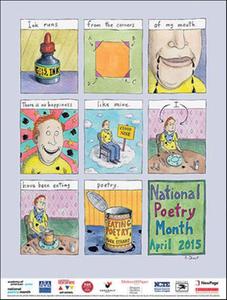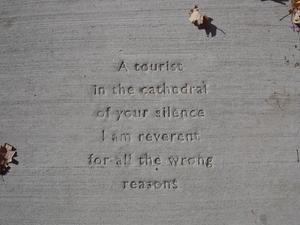 Ten random, or not so random, thoughts as spring and National Poetry Month blossom once again:
Ten random, or not so random, thoughts as spring and National Poetry Month blossom once again:
1. I prefer to begin my National Poetry Month this year with Amanda Palmer reading Polish Nobel Laureate Wislawa Szymborska's poem, "Possibilities."
I prefer the absurdity of writing poems
to the absurdity of not writing poems.
2. National Poetry Month is much better than the lack thereof. Cynics insist the public's poetic attention span should be longer than 30 days. Maybe so, but a month of focused attention annually is still better than year after year of general neglect.
3. I like the idea of people writing poetry who are not poets--especially children. For example, the Toadstool Bookshop, Milford, N.H. is "calling all young poets K-12! Celebrate National Poetry Month and win a prize! Free verse or rhyme-up to 15 lines!"
4. I've written and published poems, but I'd rather be a great poetry reader than a bad poet. And as a former bookseller, I really love the concept of a month in which customers enter independent bookstores nationwide, explore poetry displays and ask booksellers to recommend some great new poets. Handselling excellent poetry is so much better than writing bad poetry. 5. Poetry is everywhere. To celebrate the end of a very brutal winter, the Cambridge, Mass., Department of Public Works, along with staff from the Cambridge Arts Council and public library have partnered for a Sidewalk Poetry Program. As crews from the DPW "replace sidewalks damaged by the winter's historic snowfall, they will imprint poetry written by residents into the slabs, hoping to capture the attention of pedestrians," the Boston Globe reported. The initiative was inspired by a similar project in St. Paul, Minn., which began in 2008 and now showcases "more than 450 poems imprinted on the city's sidewalks."
5. Poetry is everywhere. To celebrate the end of a very brutal winter, the Cambridge, Mass., Department of Public Works, along with staff from the Cambridge Arts Council and public library have partnered for a Sidewalk Poetry Program. As crews from the DPW "replace sidewalks damaged by the winter's historic snowfall, they will imprint poetry written by residents into the slabs, hoping to capture the attention of pedestrians," the Boston Globe reported. The initiative was inspired by a similar project in St. Paul, Minn., which began in 2008 and now showcases "more than 450 poems imprinted on the city's sidewalks."
6. Poetry Month always begins on April Fools Day. I used to think that was unfortunate, but I changed my mind because the poetry world can sometimes take itself a little too seriously. On April 1, the Bookseller countered that tendency by "reporting" that Profile Books had acquired a poetry manuscript by Jeremy Clarkson, the disgraced and recently sacked star of British TV's hit show Top Gear: "The collection was said to 'draw heavily on ontological questions surrounding the nature of reality,' showing the influences of 'Emily Dickinson, Karl Ove Knausgård and the Vauxhall Zafira.' "
7. On the other hand, poetry is serious business. The Guardian's poem of the week is Elaine Feinstein's "April Fool's Day," a stark reminder of the power, and powerlessness, of verse:
Does anybody know what it was all for?
Not Private Rosenberg, short as John Keats.
A nudge from Ezra Pound took him to war,
to sleep on boards, in France, with rotting feet,
writing his poetry by candle ends....
He died on April Fools' Day on patrol...."
8. A confession: Sometimes--and I'm not mentioning any names--I prefer the poems to the poet. This is primarily, though not exclusively, true of living poets. On reflection, it is probably better than preferring the poet to the poems.
9. I know many poets. They do not read poetry like I do. While I try to examine the surface cracks and seams of a well-crafted poem, as I might look at the brush strokes of a painting up close, they can see through those cracks and seams and tell me how the poem was made. I admire their knowledge and focus and insight, but do not envy them.
10. As Poetry Month begins, I've saved the best for last. From a Guardian essay, "I am in love with poetry," by Andrew O'Hagan: "Maybe the optimists are right; maybe poetry does help you live your life. And maybe they are more right than they know, and it rounds you out for death, 'the dark backing that a mirror needs,' as Saul Bellow writes in Humboldt's Gift, 'if we are to see anything....' And where the times are brutal and the banks are deluded and the adverts are venal and the news is all lies, perhaps the madness of poets represents the rage of the imagination against the viciousness of reality. 'I could see that Humboldt was pondering what to do between then and now,' writes Bellow, 'between birth and death, to satisfy certain great questions. Such brooding didn't make him any saner.' Yet the world is more than the settled mind, said John Clare, Robert Fergusson, Arthur Rimbaud and Sylvia Plath. It is more than our ordered sense of it, and poetry is the least servile of all our forms. That is why I love it." --Robert Gray, contributing editor (column archives available at Fresh Eyes Now)

